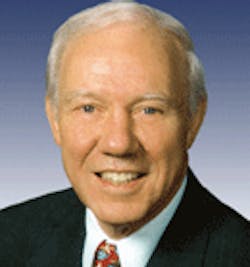In one of his last press conferences as chairman of the House of Representatives’ Committee on Transportation and Infrastructure, outgoing Congressman James Oberstar (D-MN) called for at minimum a one-year extension of the current highway bill if full six-year reauthorization cannot be achieved by the end of this year.
“My recommendation is that we pass a one-year extension rather than these ‘month to month’ bills meant to ‘hold people’s feet to the fire.’ These are just not reasonable,” he said during an “exit roundtable” held with reporters in the Rayburn Office Building in Washington D.C.
“If we can’t pass a full six-year highway reauthorization bill, we should pass a one-year extension to give Congress and the White House time to come to an agreement on a funding mechanism for it,” Oberstar said.
The Obama administration settled on an 18-month extension when the previous six-year SAFETEA-LU highway funding bill expired on Sept. 30 last year. Oberstar has long pushed to get a new six-year $500 billion bill in its place but said disagreements between the Congress and the White House over how to fund it stalled his efforts.
“I feel that there’s a big hole in our legislative agenda by not having completed that work,” he said. “We’d reported the [new highway] bill from subcommittee by June 2009, but it stalled as Congress and the White House were unable to agree on a financing method.”
Oberstar added that if the executive and legislative branches of the Federal government could come to some agreement on financing issues, he believes a full six-year bill could be passed during the balance of the current 111th Congress.
However, he added, it’s more than likely that a passage of a full six-year highway bill will be a challenge left to his replacement, Rep. John L. Mica (R-FL). With the Republican Party winning back control of the House in the mid-term elections earlier this month, Mica is expected to become the next chairman of the transportation committee.
“Moving forward on the funding issue is the ‘Gordian knot’ for surface transportation,” Oberstar said. “If we’d followed the recommendation from the [the National Surface Transportation Infrastructure Financing] commission for a 25-cent per gallon hike in fuel taxes [in 2009] the whole funding issue would have been history.”
Oberstar added that after failing to win re-election, he does not plan to join any lobbying firms, but rather will seek to be involved “more broadly” on transportation policy issues, particularly in terms of transportation safety.
About the Author
Sean Kilcarr
Editor in Chief
Sean Kilcarr is a former longtime FleetOwner senior editor who wrote for the publication from 2000 to 2018. He served as editor-in-chief from 2017 to 2018.
